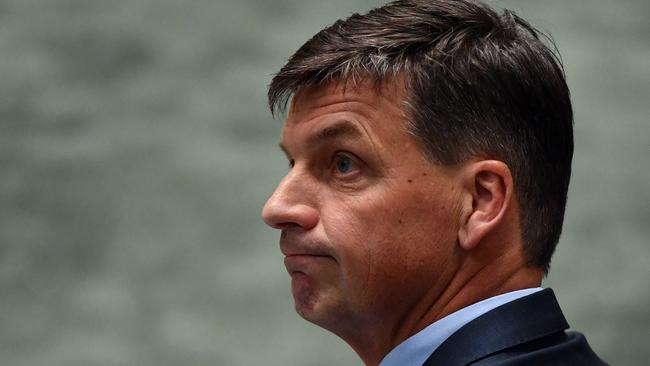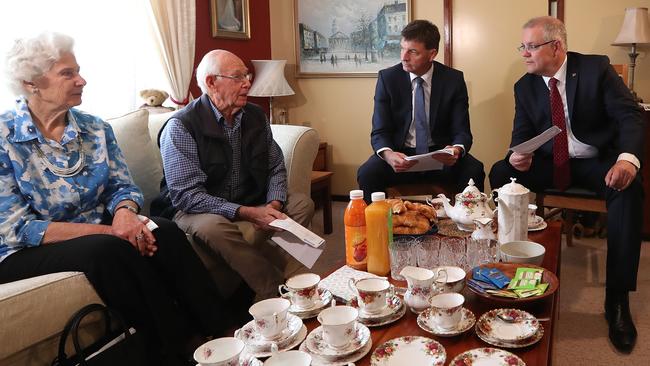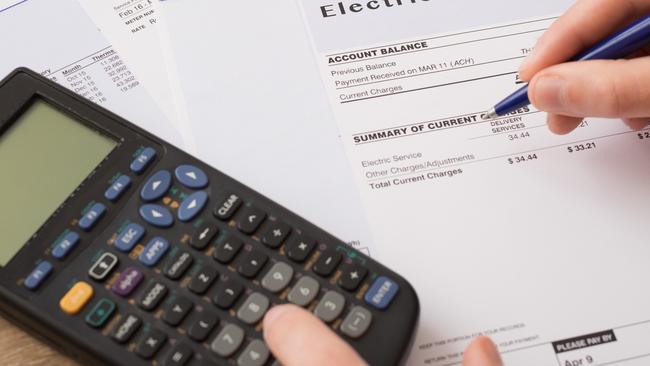Consumers have their own ‘big stick’ when it comes to power
Scott Morrison dubbed Angus Taylor the Minister “to get electricity prices down”. Now Taylor must, not just for consumers, but for the sake of his political career, writes John Rolfe.
Opinion
Don't miss out on the headlines from Opinion. Followed categories will be added to My News.
- Climate change doom talk robbing kids of their childhood
- Is the curse of Turnbull looming over Gladys?
Angus Taylor arguably has the hardest job in the federal government. Eleven months ago Scott Morrison dubbed him the Minister “to get electricity prices down” after the two of them had coffee and croissants with retirees Arthur and Edith Parnwell.
I rang Mr Parnwell this week to see what has happened to his bills since then.
“They’re down by 15 to 18 per cent,” he said.
Now Mr Taylor, whose formal title is energy minister, cannot claim credit for all of that.
But the reforms he has overseen that started July 1 have made it easier for savvy consumers to save money.
Because not only have the changes stamped out the very worst rorts, they’ve simplified comparison of competing deals.
Until recently, a plan boasting a 30 per cent discount could have been more expensive than one promising 15 per cent savings off standard rates. Crazy.

Since the reforms that’s no longer the case. It’s basically apples for apples.
The Parnwells are saving money because they took action to find a better deal.
Only a mug wouldn’t.
I read Alan Jones’s column in The Daily Telegraph on electricity bills this week. And generally speaking I agree with its sentiments. There has been immense “policy stupidity”.
However, in my opinion, it’s unreasonable to complain about that unless you’ve first done everything you can to lower your bill.
I’m not saying the people he quoted hadn’t hunted for the best deal. But many people haven’t.
Fewer than one in five households have changed provider in the past year, official data shows.
By contrast four out of five people reckon the cost of power is a major headache, according to a survey consumer group Choice published last month.
We should complain about policy stupidity. However it doesn’t bring the bills down.
If you haven’t shopped around in a while, find your latest bill and visit www.energymadeeasy.gov.au today.
As Mr Parnwell told me: “Don’t’ just settle for what you’ve got.”
What can be used is the ultimate sanction — taking your business elsewhere. Even the mere threat of doing so will likely lead to a better deal.
In that sense, it’s a bit like your own “big stick”. Do better or else.

This week the government introduced its “big stick” legislation to parliament, which contains a provision that could trigger the break-up of big energy companies. Again, do better or else.
It is controversial and some doubt whether it will have any positive effect.
“We are still very unclear of how it will be used and when and if it will solve a problem,” Energy Users Association of Australia CEO Andrew Richards said.
Grattan Institute energy program director Tony Wood said the bill was “chest beating”.
“Bashing up the power companies is good political meat,” Wood said. “But I haven’t seen an explanation of how it will actually reduce prices.
“A lot of people in the Liberal Party are very uncomfortable with the big stick,” Wood said, because it goes against their ideology. However the party leadership is convinced it’s what the public want.
“I think the ‘quiet Australians’ want to see the big energy companies held to account,” Taylor told me.
Undoubtedly the government is getting better at explaining how the big stick could help to bring power prices down. In our opinion pages yesterday Josh Frydenberg set out the three ways the government says the big stick legislation will keep rogue power businesses in check.

As consumers, the one that is most interesting is, “where there is a ‘sustained and substantial’ reduction in costs, retailers would be required to pass them on”.
So, for example, if wholesale power gets cheaper, they can’t just trouser the benefits.
The average price in the national electricity market for three years from now is $64 per megawatt hour versus $88 now — a 27 per cent saving. If that was passed on it would save a family about $170 a year.
“We have to make that happen,” Taylor told me this week.
Too right. And not just for consumers. He has to do so for the sake of his own political career.
In the final week of the election campaign, the Prime Minister set Taylor the challenge of cutting wholesale electricity prices by 25 per cent by 2022.
It’s such a specific goal that the government has to pull out all stops to achieve it.
“I wonder whether they’ve made a rod for their own back,” the EUAA’s Richards said.
The problem is there are so many variables, including as a result of the impact of renewable energy, with its variability, and rooftop solar, with its impact on the power grid.
“It’s probably more of a muddle than it’s ever been” Richards said.
“It’s a tough time to be an energy minister.”
Follow John on Twitter: @rolfey
